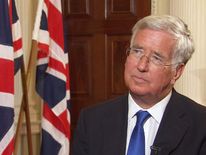Abuja, Nigeria - Bekky Benson wakes up at 3am each working day. She observes her morning devotion for an hour, takes her bath and dishes out instructions to her children before hitting the road.
The commute from suburban Nyanya to Abuja - the capital city of Africa's biggest economy, Nigeria - takes about 40 minutes. The 46-year-old chef usually hops on a bus or a shared taxi, humming all the way to work.
Bekky, like other residents of Nyanya, works in the city centre, but lives in the suburbs where accommodation is cheaper.
At around 6am, she starts her day at Saffron Cafe, where she has been working for more than a year. She must prepare an array of dishes - from meat, fish and chicken pies to beef satay, salads and sandwiches - to be ready by the time customers start trooping in at 8am.
When the doors open, waiters in crisp white shirts, black slacks and bright red bow ties glide from table to table, taking orders. A trendy young crowd chatters away over cappuccinos, lattes and fruit teas as soft music plays in the background.
'Cafes are not really a Nigerian thing'
This scene was virtually unknown 10 years ago, ostensibly because people socialised differently. It was more common for social gatherings to occur in the homes of friends and families or beer parlours, popularly referred to as "gardens" in Abuja.
Indeed, cafes are a relatively new phenomenon in Abuja and often viewed as a Western concept.
"I know there are cafes. But it has never crossed my mind to go there," says Eunice Chindo, an advertising manager in her 30s. "Cafes are not really a Nigerian thing. It's something you pick up when you travel abroad."
Similarly, radio presenter Safiya Ibrahim has never been to a cafe in her life. "It's not our culture to go for tea or coffee."
There are a number of reasons why Nigerians love their beer parlours: People are quite used to their way of life that it doesn't occur to them to try something new, Ibrahim says.
A garden features a typical menu comprising local dishes - roasted beef, chicken, fish and lots of alcohol. In contrast, cafes tend to be more continental in the dishes they serve.
Whereas in gardens, the music is loud, the television set is loud, fans cheer for their favourite teams and people talk over one another, "when you step into a cafe," Ibrahim says, "the first thing you think is: this place is posh, and how much am I going to spend? That's the mindset."
While money is an issue, some are embracing this non-traditional way of socialising.
Chindo, for instance, says she is looking forward to having a cafe experience, just for the fun of it. While Yakubu Bako, another radio producer, explains that he is a cafe lover and visits at least twice a week. In his view, the attraction is the atmosphere.
"There's this cool ambience, which is really nice. I go there to relax because the atmosphere is not noisy," he says. "I go alone with a book and read. The peace and quiet is great."
Cafe lovers also say it's a place to do light work, have meetings and light refreshments, access the internet and meet with friends.
Exploring new grounds
As the capital city, Abuja attracts visitors from across the world. This pool of people is seen as a ready market as Ben Inienger, the owner of Saffron, notes.
"I looked around the area and noticed that there were no cafes," says Inienger. Yet, there are lots of professionals, embassies and other expatriates.
"People discouraged me, asking who would go to a cafe to drink tea and coffee in a country as hot as ours. But the demography in Abuja is international - it is not only for Nigerians."
Saffron is located in the highbrow Maitama district. For now, it mainly attracts clientele made up of professionals, returning Nigerians and expatriates. It's not unusual to see French, Russian, British and American nationals in cafes around Abuja.
Although, she's an expatriate, Tuyana Manzigheeva, a Russian who has spent more than five years in Abuja, still finds cafes pricey. She explained that in comparison to Nigeria, there are thousands of places for all pockets and sizes in St Petersbug, where she has her home.
Returning Nigerians, craving a semblance of the type of life they were used to when abroad, are delighted to see this new trend, however.
Terri Padonu moved back to Nigeria from the United States five years ago to explore new opportunities. "Cafes are trendy for relaxation. It makes me feel like I'm still abroad. It reminds me of where I'm coming from."
Aisha Attah, who returned from the United Kingdom four years ago in order to "plug back" and seek new opportunities as well, sees it more in practical terms. She frequented cafes when she had just came back, seeing it as a temporary work/office space for returnees before settling in.
While people like Padonu and Attah contribute to this trend, other Nigerians such as Baku have also warmed to the idea.
The growing acceptance is reflected in the number of people who frequent cafes. On a busy day, Saffron caters to some 200 customers. Weekdays are hectic, particularly during lunch hours, says Inienger.
There are challenges. For instance, the electricity supply is unreliable, forcing businesses to spend money on buying and maintaining generators.
Inienger highlighted the challenge of properly training staff to perform to the higher standards of customer service that expatriate customers expect. The key, in his view, is to have an efficient and motivated staff equipped with the right type of training for the job.
He says dedicated employees such as Bekky are key.
Ghanaian by birth, Bekky recalls with nostalgia her childhood days, hovering over her mother in the kitchen, where she learned a lot about cooking.
"My mother cooked and baked all the time," she says, adding that it was a beehive of activities in the kitchen.
"I love my job. I love it when people eat my food and enjoy it. That makes me happy."





